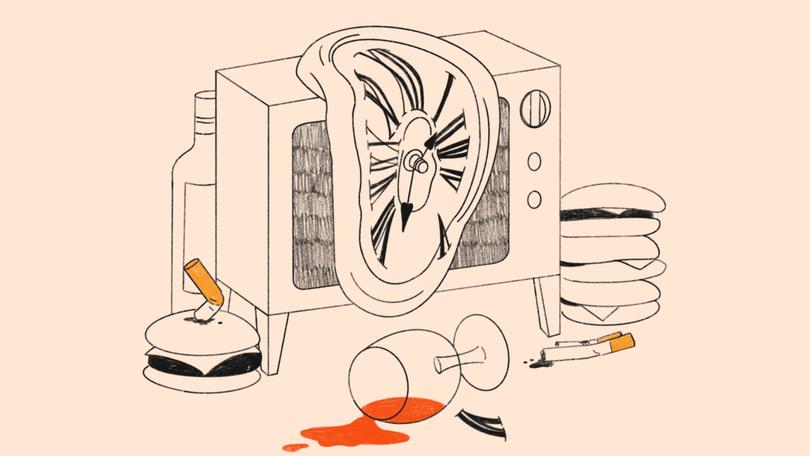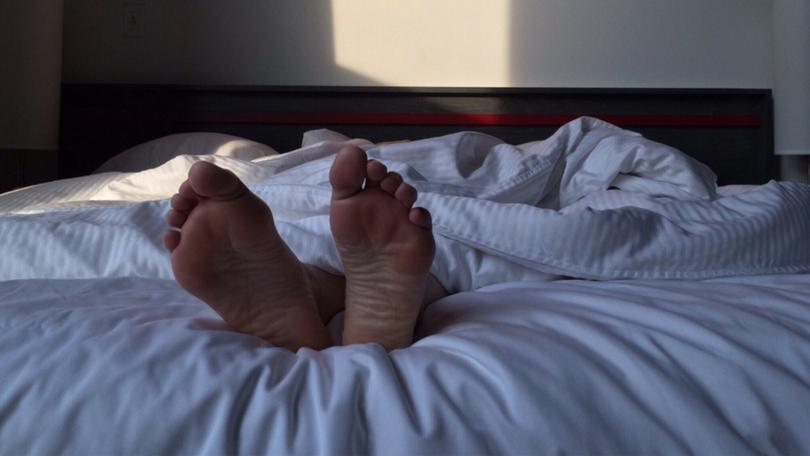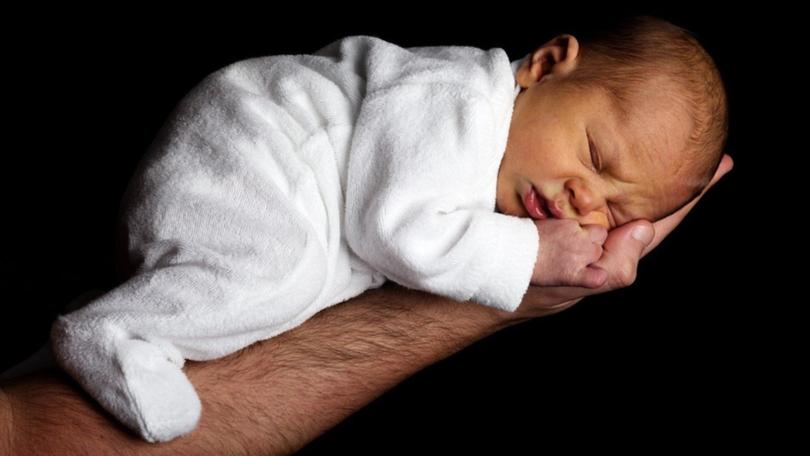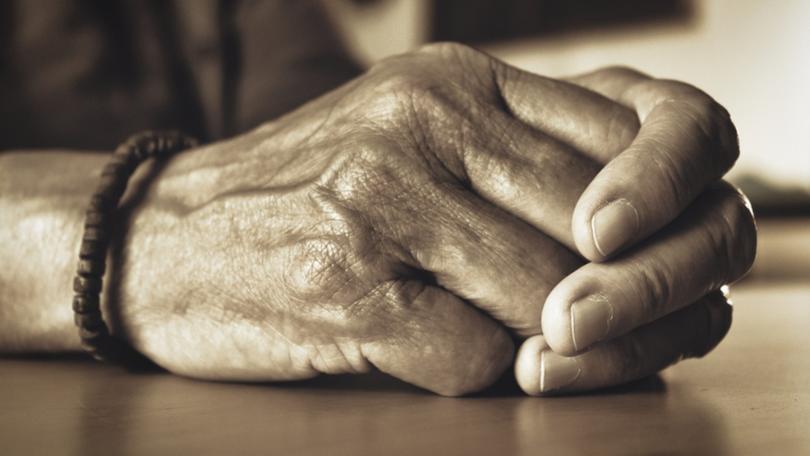Exactly how many minutes, hours and days all those bad habits will take off your life
From a single cheeseburger to that extra glass of wine, the sobering science that reveals the habits that are slowly killing us

Are you a worrier? Then perhaps don’t read this article.
Scientists have proved that the more you worry, the shorter your lifespan — up to 2.8 years for chronic worrywarts.
If, on the other hand, you want to turn over a new leaf for a new year, but need some motivation, read on.
Sign up to The Nightly's newsletters.
Get the first look at the digital newspaper, curated daily stories and breaking headlines delivered to your inbox.
By continuing you agree to our Terms and Privacy Policy.For here, laid out in forensic detail, we show exactly how much our bad habits cost us — in seconds, hours, days and years taken off an average lifespan.
Research published earlier this week, for example, suggests that just a single cigarette reduces life by 22 minutes if you’re a woman; 17 minutes if you’re a man.
But who knew that a pizza shaved off seven minutes and eight seconds, a glass of wine 30 minutes and an hour of television another 22!
The good news? Reversing poor habits can turn the clock back again.
If you want to live a long, but very abstemious, and possibly just a little bit dull, sort of life, that is...

SMOKING ONE CIGARETTE = 22 MINUTES OFF YOUR LIFE
Warnings about the health dangers of cigarettes have been printed on packets since 1971 in the UK and, since then, evidence about the risks of lung cancer, heart disease and respiratory illnesses has grown.
In 2000, a study in the British Medical Journal estimated every cigarette smoked took about 11 minutes off a person’s life.
But the latest research, carried out by University College London and published in the Journal of Addiction, suggests each cigarette actually costs a woman 22 minutes of a healthy life, and costs a man 17.
That means a packet of 20 will rob your life of almost seven hours.

AN HOUR WATCHING TELEVISION = 22 MINUTES
We’ve heard it all before — our Netflix addiction is rotting our brains and giving us square eyes and short attention spans.
It’s also, according to a study published in the British Journal of Sports Medicine, shortening our lives.
The researchers looked at data from nearly 12,000 adults and concluded that every hour spent watching television over the age of 25 reduces your life expectancy by 22 minutes.
So that eight hours you spent breathlessly bingeing Rivals?
That’s taken you nearly three hours closer to your actual final breath.
The study didn’t look at whether this was a causative effect, or simply a correlation.
For example, those who watch television tend to be more sedentary and it’s well known that a sedentary lifestyle is closely associated with death from all sorts of conditions, but particularly diabetes and heart disease.
So if you watch while trotting on a treadmill or an exercise bike, you probably don’t have to worry.

EATING A CHEESEBURGER = 8 MINUTES, 8 SECONDS
The latest thinking on food argues that Ultra Processed Foods are not all as bad as each other, and that a little bit of what you fancy does you good (occasionally).
Helpfully, researchers at the University of Michigan in the US have undertaken a detailed analysis of the impact on health of a vast range of different foods, which means we can pick and choose with the science at our fingertips.
The result, the Health Nutritional Index, classifies almost 6000 foods according to the number of minutes they take off, or put on, your life.
Fancy a cheeseburger? That will shave off eight minutes and eight seconds.
A serving of bacon? Six minutes and 30 seconds.
Pizza? Seven minutes and eight seconds, while a single hotdog scores a scary 36 minutes.
That’s because hot dogs are likely to be high in salt, saturated fat and additives that pose an increased risk of cancer.
All is not lost, however.
If you want to tip things in your favour, a portion of broccoli will add 11 healthy minutes to your life, and a handful of nuts, an impressive 26 minutes.
According to Olivier Jolliet, one of the study authors, this sort of analysis is essential as bad diet is responsible for more deaths each year than tobacco, alcohol or drug use.

GETTING DIVORCED = 2 YEARS, 4 MONTHS
A messy divorce might feel like it’s taking its toll — and it probably is.
Researchers looked at almost 165,000 people over the age of 65 and found that married men could expect to live two years and four months longer than divorced men.
For women it was one year and three months.
Those who had been widowed or never married had similar life expectancy to those who were divorced.
Researchers have theorised that rather than the stress of divorce being responsible, this might be because a lack of contact with others increases your risks of dying at a younger age.
But also there’s a “nag factor” involved.
Married people tend to have someone who prompts them to seek medical attention for that cough that just won’t go away, or the dodgy mole on the back of their leg, meaning they’re more likely to catch life-threatening diseases earlier, when they’re more treatable.

HAVING AN EXTRA GLASS OF WINE = 30 MINUTES
You don’t have to be an alcoholic to feel the effects of booze on your health (as many of us waking up over the festive season with a hangover will testify).
And while we might cling to the idea that the antioxidants in red wine make it practically a health drink, the reality is that, according to a 2023 review that looked at all the evidence, broadly speaking, moderate drinkers don’t live longer than non-drinkers.
Indeed, there’s overwhelming evidence that drinking more than the daily recommended amount does reduce your life expectancy.
A paper published in The Lancet in 2018 concluded that the upper “safe” limit was just five 175ml glasses of wine or five pints of beer a week — about 12.5 units in total.
Every unit above that is estimated to take around 15 minutes off the life of an average 40 year old.
This means an extra glass of wine or pint a day — each of which contain about two units — will take half an hour off your life, thanks to the increased risk of conditions such as heart failure, stroke, and aneurysm, or a ruptured artery.
By contrast, if you’re a single glass of white wine a day sort of person, but go dry for the whole of January — and forgo those extra glasses a week above the upper “safe” limit — you’re lengthening your life by four hours.

SITTING FOR OVER THREE HOURS A DAY = 2 YEARS
Go looking on the internet for behaviours that can shorten your life and you’ll find a joke about how going to the office shortens your life by eight hours a day.
But the less funny reality is that, unless you’ve swapped your office chair for a standing desk, you genuinely are cutting your life short by sitting in front of a screen.
A paper published in 2012 looked at sedentary behaviour and life expectancy in the US and concluded that “limiting sitting to less than three hours a day may increase life expectancy at birth . . . by approximately two years”.
This is likely to be because a sedentary lifestyle is associated with a higher risk of several conditions, including cardiovascular disease, diabetes, obesity and some cancers.
Another study had better news, finding that just 22 minutes a day of moderate to vigorous exercise was enough to offset the increased risk of death from prolonged sitting.

TAKING A LINE OF COCAINE = 6 HOURS, 38 MINUTES
It’s illegal of course, but apparently as popular among middle-class Millennials as ever.
Yet the drug of choice at a Cotswolds dinner party has a significant impact on life expectancy.
The American Addictions Centers — a large chain of rehab clinics in the States — has a helpful online calculator to crunch the numbers for you.
According to their data, one line of cocaine can take 397.8 minutes — almost seven hours — off your life.
So even one line a week from the age of 30 will take almost two years off your life expectancy.
This is because long-term cocaine use can increase the risk of blood clots, which in turn can lead to heart attacks, pulmonary embolisms, strokes and deep vein thrombosis.

SLEEPING BADLY = 4 YEARS, 8 MONTHS
According to research last year, poor sleep habits can knock years off your life — to be more precise, around five if you’re a man and almost two and a half if you’re a woman.
The study looked at more than 172,000 adults and assessed what are known as “low-risk sleep behaviours”.
Subjects were given plus points for being early birds (rather than night owls); sleeping seven to eight hours a day; not having insomnia; not snoring, and not feeling tired during the day.
The evidence seemed to show those who scored more highly tended to live longer than those with poorer sleep habits. Sleep is essential for the body to heal and restore itself.
Poor sleep means that these processes can’t happen efficiently and the result is an increased risk of a number of diseases, including heart attacks, dementia and diabetes.

HAVING A CHILD = 1 YEAR, 8 MONTHS
If you’re a parent of young children, the Christmas “holidays” might not have felt like much of a holiday, more an endurance test.
So it might not be a surprise that research suggests having children can, indeed, shorten your life — even if it doesn’t feel like it when you’re reading The Gruffalo.
According to a paper published in the American Journal of Human Biology in 2006, women lose one year eight months of life for every child they carry.
In part, this is due to hypertension and pregnancy-related diabetes. (However, it might also be because the data that the researchers looked at was based on Polish statistics that dated back to 1886 when death from childbirth was more common.)
But there’s a lot of other conflicting research suggesting those with children tend to live longer than those without.
For example a Swedish study showed that, at the age of 60, men who had children could expect to live two years longer than those who didn’t.
For women, it was one and a half years longer. So maybe don’t make a decision on whether or not to have kids based on the impact it will have on your life expectancy.

WORRYING ABOUT AGE = 7 AND A HALF YEARS
Here’s the major rub: the more you worry about getting older, the more likely you are to die younger.
A study published in 2002 analysed the results of a questionnaire issued to 660 people aged 50 and older — and followed it up more than 20 years later to see if they were still alive.
The initial questionnaire included questions such as “do you agree or disagree that as you get older you are less useful?”
The research found that those with more positive perceptions of ageing lived an average of seven and a half years longer than those with more negative attitudes.
According to Becca Levy, the Yale professor who led the research, much is down to how the society in which you live views age.
In Japan, where older people are revered and seen as wise, people tend to live longer than in the US, where they are seen as a burden.
The perfect reason not to worry about longevity — and to call out ageism when you see it!
